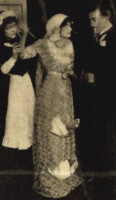Put Yourself in His Place Filming Locations

We do not have enough information on the filming locations of Put Yourself in His Place.
Put Yourself in His Place Filming Locations
Put Yourself in His Place (1912)
The story concerns the love of Henry Little for Grace Carden and its reciprocal sentiment, with the time-honored interference of those who attempt to arrange the affairs of Cupid to suit social exigencies. There is a complexity of kinship involved; Edith Raby has married a man beneath her station and lost her husband at a time her brother might have helped her, and she accuses the Squire of being the direct cause of her widowhood. This presents us with a hero in Henry Little of noble descent and far more noble character. And there is an incidental clash between Henry Little as a skilled workman, a carver of wood and a forger of steel tools, and the thick-headed members of a union; then the fate of the principal characters, hinges upon such a trivial incident that the plot seems to depend on the element of chance. The real motif is the triumph of a thoroughly modern and efficient young man when he is at first opposed to a low environment of inefficiency among workmen and when he is afterwards opposed by the equally inefficient leisure class from which he is descended. Henry Little is a type of young man highly honored in America, the one who is tried out and proves his innate quality. He is supporting his mother, because she refuses to permit any relations with her wealthy and aristocratic brother, Squire Raby, when Grace Carden engages him to instruct her in the art of wood carving. Grace is the godchild of Squire Raby, and the Squire favors the suit of a pleasing gentleman of leisure named Coventry. Henry has succeeded in reaching the sympathetic interest of Grace and has established an independent forge of his own in a deserted church on the domain of Squire Raby when he becomes sick with jealousy over the interposition of a man he knows to be of no value to himself or to the world. As it is not possible for him to earn his living where organized labor has become organized persecution he has been compelled to pursue his work in secret, and he is aided in this by his former employer. The church is one long deserted by reason of a shifting of population and is on the road to decay, but is not a ruin. It has been protected from complete destruction by Squire Raby, but it is so far out of the way as to be rarely visited by curious tourists. Into this romantic setting are projected a forge, anvil, bellows, tools and lathes of steel, and amid these solemn surroundings the young mechanic pursues his strange flares of light within it at night awakening uncomfortable suspicions among the nearest night watchers, some shepherds on neighboring hills. After discovering that the pretensions of Coventry are dangerous ones, Henry loses heart and tries to work away the misery from which he suffers, spending nearly all of his time, night and day, in a feverish attempt to conquer unfavorable circumstances by determination and unremitting labor. One day, when Coventry and Grace are exploring the neighborhood of the church, they are overtaken by a storm. They become exhausted in a vain struggle to reach shelter and are on the verge of collapse when they note a light in the windows of the deserted church. They make a last desperate attempt and succeed in reaching the church door. Henry takes them into his peculiar workshop and revives them. After explaining the strange necessity which forced him to pursue his honorable calling in such a place, he extracts an oath of secrecy from both, and in due time they rejoin their friends. From all accounts it seems about as easy for an English gentleman to turn villain as it is for a New York politician to turn crook. Grace keeps her word, but Coventry has seen enough to excite his jealousy and he visits a resort of factory workmen with the news. He leads them to the deserted church; they break in and a desperate fight ensues, Henry using his tools and hot cinders as weapons until he is nearly overpowered. Squire Raby arrives and effects a rescue only to find that the young workman is his own nephew. Henry is now set up in business for himself, with a factory of his own, but the villain's villainies grow more and more villainous. Henry's factory is blown up at a time he is supposed to be within it, though he is in reality on his way to America. Grace mourns him as dead for a while, but finally consents to marry Coventry. The number of ladies who have nearly married villains is only exceeded by those who really have. Coventry has succeeded in intercepting all communications from Henry except the very last one, a telegram received on the eve of her marriage. Now Miss Sweet Simplicity, Jael Dence, no longer deserving her name, gets her pretty fingers on the dispatch and it reaches Grace with happy consequences better shown in the picture than can be described.
